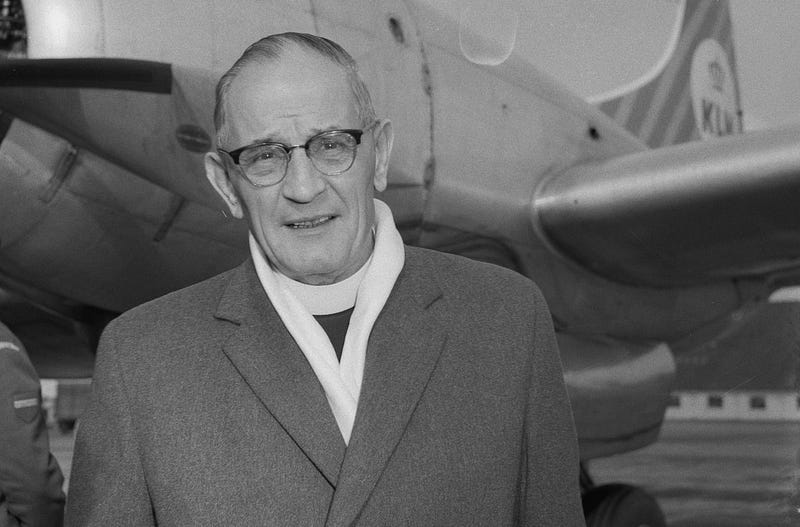FIRST, THEY CAME FOR THE JEWS (YAWN)
Neimoller’s poem is a pessimistic, selfish, lazy person’s response to injustice. And the vast majority of non-Jews can’t even muster the energy to rise to that negligible request.
Rev. Martin Niemoller, a Lutheran theologian who was imprisoned by the Nazis at Sachsenhausen and Dachau, wrote a famous poem, which is an oft-quoted mantra of progressive people:
When the Nazis came for the communists,
I remained silent;
I was not a communist.
When they locked up the social democrats,
I remained silent;
I was not a social democrat.
When they came for the trade unionists,
I did not speak out;
I was not a trade unionist.
When they came for me,
there was no one left to speak out.
I’ve always found it ironic that progressives (or anyone, really) would invoke this poem. (Is it a poem? It doesn’t even rhyme!) Ostensibly, it is a call to vigilance. In practice, it is a cynical call to self-interest.
Less a call to arms against antisemitism, it is a warning that if you do not stand up for people who are oppressed when evil comes for them, there may be nobody left to come to the aid when evil comes for someone you actually give a damn about.
Neimoller wrote the piece in 1946. And for at least as long as people have been reciting it, they have been coming for the Jews. And what have we progressives (or almost anyone else) done about it other than recite poems and bromides like these?
At synagogues in Pittsburgh and Poway, at kibbutzim in southern Israel, at Jewish institutions across Europe, the amorphous they have been coming for the Jews. And what have we done?
We have dismissed every one of these incidents, effectively, as a (perhaps) sad but inevitable byproduct of the Middle East conflict.
When opportunities have presented themselves for good people to stand up in opposition to antisemitism and violence against Jews, we have opted overwhelmingly for silence.
A few evangelical and other Christians express empathy and outrage. Politicians, especially those with significant Jewish constituencies, issue statements. A few kindhearted souls have sent cards or emails promising to pray for the safety of the Jews — I’ve received some of them when my workplace, Hillel, had rocks thrown through its windows on the anniversary of Kristallnacht and when two of our students were beaten up and had their Stars of David ripped from the chains around their necks.
But hardly as many who have recited Niemoller’s chestnut over the years, or who have bought fridge magnets bearing his words, or taped posters to their walls expressing Niemoller’s sentiments or expressed thoughts of a general good nature have actually come to the aid of Canadian or Israeli or other Jews when the opportunity presented itself. By the millions, these people have remained silent.
Hundreds of thousands of students on campuses throughout Canada have remained silent as their elected student governments and student newspapers spewed forth anti-intellectual, morally obscene and racist assertions against Israel and against Jews.
When their allies in the trade union movement, in the New Democratic Party, in our human rights groups, wear buttons urging us to “Globalize the intifada,” we remain conspicuously silent.
When incidents emerge, on campuses, in media and in public discourse, that should be condemned roundly by all people of goodwill, there is silence.
When universities host “Israel Apartheid Week,” during which an unrecognizably distorted interpretation is presented as history and fact, who but Jewish students speak up?
When students and professors call for universities to disallow ideas from Israel on the campus, how many deplore the self-defeating racism of this idea? (Some; not enough.)
When, year after year, police statistics and annual audits of antisemitic incidents show higher and higher numbers of occurrences of violence, threats and damage to property in the Jewish community, have these elicited commensurate sympathy or indignation?
When October 7 saw the horrific mass murder, mass rape, beheadings, immolations, torture and kidnappings of Jews, was there universal outrage? Not only was there a deafening amount of silence, there was even celebration among overseas progressives. People who self-define as peace activists, who have COEXIST bumper stickers, who outlandishly consider themselves on the side of humanitarianism, mostly fell on a spectrum between joyful revelling at raped and decapitated Jews to the more staid “It’s terrible, but …”
During the time of which we speak, progressive Canadians and others were far more likely to speak up against Jews and Israel than to address the incitement, violence and assault on civic values taking place constantly right here at home, in the name of progressive support for Palestine.
Perhaps Neimoller’s call to self-interest has been superseded by a variation on the dictum from Robert Frost, who once said: “A liberal is a man too broadminded to take his own side in a quarrel.”
Never mind self-interest, plenty of progressive activist voices are now vigorously opposed to even Niemoller’s appeal to our own well-being.
More on the nose, since the advent of self-destructive anti-Western attitudes in the West, the approach seems to be … It’s a battle between us and them. And we’re for them.
Was Neimioller being facetious? Was he so cynical, albeit perhaps correctly, that non-Jews won’t stand up for Jews unless there’s something in it for them?
Whatever his motivations, and for all the mindless repetition of his words over the decades, we now see clearly that those who spout these words won’t even speak out for Jews when it is their own self-interest.
In other words, the Neimoller poem is a pessimistic, selfish, lazy person’s response to injustice.
And the vast majority of non-Jews can’t even muster the energy to rise to that negligible request.



Neimuller’s statement was not a poem, but more of a mea culpa as he admitted to being antisemitic before, and at the start of the war, and preaching the same to his congregation.